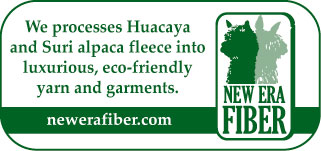Tag: "industry"
- 1
- 2
- The Australian alpaca industry has been through the speculative stage of new industry development and has emerged with a much more professional focus. Alpaca is classified as ‘maturing’ and growth prospects are described as ‘neutral to positive’. Fibre production has increased from 102 tonnes in 2006-07 to 242 tonnes in 2015-16. Meat production has emerged as a serious addition to commercial enterprises –32 tonnes of alpaca meat were marketed to restaurants in 2015-16 and strong future growth is forecast. When returns from stud animal sales, including export, fibre and meat are added into the production mix industry has the potential to be profitable. more »
- QUESTION: "I am curious about registration. How many of you do not register your animals? How do those of you who do feel about those who do not? Does it hurt the industry?" The above question was posted in a social media group. And the ANSWER is…[drum roll please] it depends. There isn't a "correct" answer. more »
- The actual 2000 recession was short, eight months. Compared to the last two years, this earlier recession was much less consequential for the alpaca farmer. The long term financial recovery of the 2000 recession lasted much longer than the actual recession. more »
- Alpacas were introduced into the U.S. from South America in 1984, and the domestic alpaca herd has grown rapidly in the succeeding 20 years. The benefits of raising alpacas are touted routinely on national television, and alpaca breeding stock in the U.S. sells routinely for prices in the range of $25,000 per head, many timeshigher than prices obtainable in Peru, where the world’s largest alpaca herd resides. We study the evolution of the U.S. alpaca industry and ask whether today’s current prices for alpaca stock can be justified by fundamental economic conditions governing the industry, or whether alpacas represent the latest speculative bubble in American agriculture. more »
- The alpaca “business” is still a game....right or wrong, we need to acknowledge it and not try to call it something else. We base breeding decisions on winnings in the show ring so that we can then produce a “winner” and sell our animals. It hasn’t changed in the ten plus years that we’ve been in the business. I wish I could share in the excitement of seeing our show system “coming back” and the numbers picking up at the shows. However, without apology, I cannot see the jubilation in perpetuating a system that doesn’t promote our alpaca industry as a livestock industry. It continues to promote it as an entertainment industry akin to the equine business. more »
- 1
- 2
